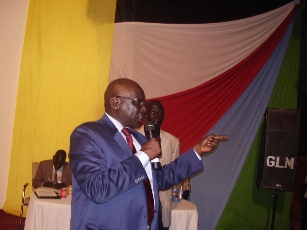S. Sudan army chief rejects IGAD power-sharing proposal
July 30, 2015 (JUBA) – The South Sudanese army chief of staff, Paul Malong Awan has expressed disapproval of the content of the recent Intergovernmental Authority on Development (IGAD) proposal to end over 19 months of conflict in the young nation.

Any proposal seeking to place the oil rich and producing region of Upper Nile under a control of the armed opposition forces allied to Machar will not be accepted, Awan said.
“We are not going to accept to replace Stephen Buay, who has resisted in division one, and then Nhial, Batong, Pul Jang, and two sector commanders: Gong Biliu and Charles Lam. We will not replace them with those who have rebelled. It will not happen. We will not reward those who have rebelled with positions in the army”, stressed the army chief.
He was speaking as chief guest of the red army day on Wednesday during which he stressed the need to reward those who fought alongside the government forces in three states of the greater Upper Nile region and in the states within the Equatoria region.
The IGAD-Plus peace proposal on security arrangements provides for at least 18 months out of the 30 months of transitional period during which to complete integration of the two rival forces loyal to president Salva Kiir and the armed opposition chairperson.
The two principals, according to the proposal, will separately be the commanders-in-chief of their respective armies, pending completion of the integration process. The two forces will begin to assemble 90 days after signing of a final peace agreement.
South Sudan’s capital, Juba is expected to be demilitarised and its security provided by international and regional forces. A radius of 25kms will be imposed for 30 months until the end of the transitional period. President Kiir will be allowed to have 260 soldiers as bodyguards while the armed opposition leader, Machar, will have 195 bodyguards.
On economic sector the proposal stressed the importance of realising major reforms that will ensure equitable distribution of wealth in the country. The document does not, however, detail how wealth would be shared among the different levels of government.
In the document the power sharing in the national executive would be 53% of ministerial positions for the government, 33% for the opposition faction of the Sudan Peoples’ Liberation Movement (SPLM-IO), 7% for former detainees and 7% for other political parties.
In the oil-rich greater Upper Nile region, the SPLM-IO would have 53% in the three states of Unity, Upper Nile and Jonglei, while the government would take 33% and 14% divided between former detainees and other political parties. No power sharing in the seven states of greater Bahr el Ghazal and greater Equatoria regions as government would take 100% in the two regions.
(ST).
